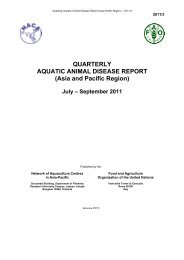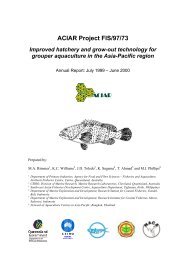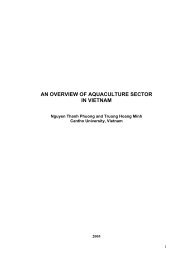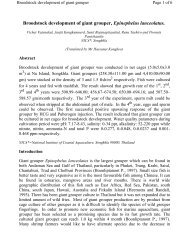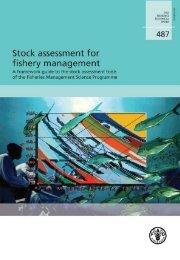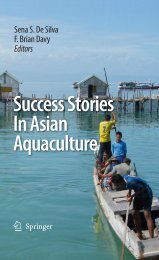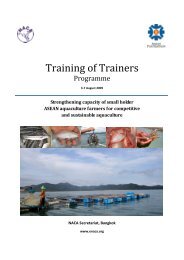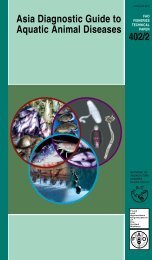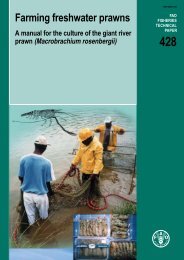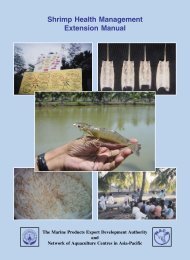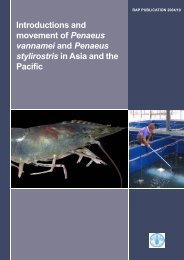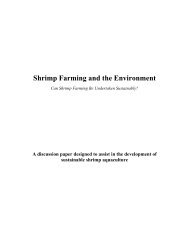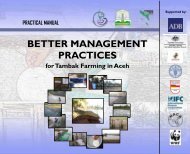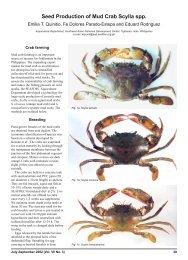State of World Fisheries and Aquaculture 2004 - Library
State of World Fisheries and Aquaculture 2004 - Library
State of World Fisheries and Aquaculture 2004 - Library
You also want an ePaper? Increase the reach of your titles
YUMPU automatically turns print PDFs into web optimized ePapers that Google loves.
130<br />
The <strong>State</strong> <strong>of</strong> <strong>World</strong> <strong>Fisheries</strong> <strong>and</strong> <strong>Aquaculture</strong> <strong>2004</strong><br />
industry; the Asia-Pacific Economic Co-operation group <strong>of</strong> countries have published<br />
a study <strong>of</strong> the nature <strong>and</strong> extent <strong>of</strong> subsidies in the fisheries sector <strong>of</strong> its member<br />
countries; <strong>and</strong> FAO has prepared a detailed guide to help countries to measure their<br />
fisheries subsidies. The gathering <strong>of</strong> the data constitutes an important first step,<br />
but is only a first step. Subsidies themselves are not <strong>of</strong> primary interest. What is <strong>of</strong><br />
primary concern is their effect on the behaviour <strong>of</strong> people <strong>and</strong> firms. Do the subsidies<br />
negatively affect international trade? Do the subsidies encourage firms <strong>and</strong> fishers to<br />
take actions that are detrimental to the stocks <strong>of</strong> fish that they catch?<br />
Certain subsidies, for instance a boat bounty whereby government pays a certain<br />
share <strong>of</strong> the cost <strong>of</strong> building <strong>and</strong> equipping a fishing vessel, theoretically would lead to<br />
overfishing. After all, the costs facing the fisher or fishing firm are reduced, the firm’s<br />
anticipated pr<strong>of</strong>its rise, <strong>and</strong> there would be a double stimulus for overfishing: first, with<br />
positive unit pr<strong>of</strong>its from catching fish, pr<strong>of</strong>its would increase as more fish are caught;<br />
<strong>and</strong>, second, the firm would want to keep its capital employed. Unless scientists were<br />
able to make an airtight case for limiting fishing, owners <strong>of</strong> this excess capital would<br />
try to convince fishery managers not to limit fishing. Because scientists are immersed<br />
in a world <strong>of</strong> uncertainty, they cannot <strong>of</strong>fer such an airtight case <strong>and</strong> <strong>of</strong>ten fishing<br />
continues at an excessive level until it is too late – the fish stock has approached the<br />
state <strong>of</strong> commercial extinction. While this is the theoretical argument, there are cases,<br />
such as that <strong>of</strong> Newfoundl<strong>and</strong>’s northern cod stock, where it has clearly happened.<br />
There are, <strong>of</strong> course, additional factors that lead to the decline <strong>of</strong> a fish stock: scientific<br />
error (as opposed to uncertainty), political pressure from communities that depend on<br />
the fishery for their economic livelihood, IUU fishing, <strong>and</strong> environmental factors such<br />
as climatic conditions, excessive predator numbers <strong>and</strong> insufficient prey, among others.<br />
The empirical questions are: to what extent do subsidies actually affect overfishing?<br />
What is the contribution <strong>of</strong> the subsidy to the firm’s anticipated pr<strong>of</strong>its (it is, after all,<br />
the anticipation <strong>of</strong> pr<strong>of</strong>its that will lead the firm to take action)? To what extent does<br />
the anticipated change in the firm’s pr<strong>of</strong>its lead it to overfish? Such analysis is at an<br />
early stage.<br />
INTERNATIONAL CONFERENCES<br />
The year <strong>of</strong> decade <strong>of</strong> change, 1992, was a watershed in the history <strong>of</strong> fisheries<br />
management. In May <strong>of</strong> that year, an International Conference on Responsible<br />
<strong>Fisheries</strong> met in Cancún, Mexico. Concerned with maintaining fish as a major source<br />
<strong>of</strong> human nutrition, the importance <strong>of</strong> preserving the marine environment, <strong>and</strong><br />
problems <strong>of</strong> excess capacity in fisheries, the conference asked FAO to prepare what<br />
was to become the International Code <strong>of</strong> Conduct for Responsible <strong>Fisheries</strong>, approved<br />
by FAO member countries three years later. Later in the year, the Earth Summit was<br />
held in Rio de Janeiro. Although no direct mention <strong>of</strong> fisheries or fishery subsidies<br />
was made, the Rio Declaration on Environment <strong>and</strong> Development was broad enough<br />
to encompass problems <strong>of</strong> fisheries. In December 1995, the Kyoto Conference on<br />
the Sustainable Contribution <strong>of</strong> <strong>Fisheries</strong> to Food Security strengthened the call for<br />
responsible fisheries. The Reykjavik Conference on Responsible <strong>Fisheries</strong> in the Marine<br />
Ecosystem, in 2001, reinforced the urgency <strong>of</strong> the need for improved fishery science<br />
<strong>and</strong> monitoring to continue the implementation <strong>of</strong> the International Code <strong>of</strong> Conduct<br />
for Responsible <strong>Fisheries</strong>. Finally, the Doha Ministerial Conference in the same year<br />
explicitly brought fishery subsidies to the forefront <strong>of</strong> consideration.<br />
THE POLITICAL DEBATE<br />
There has been great frustration with the apparent inability <strong>of</strong> existing international<br />
arrangements to control overfishing. Because <strong>of</strong> the existence <strong>of</strong> strong enforcement<br />
procedures under the WTO, there has been interest by a number <strong>of</strong> nations to find<br />
a legitimate way for the WTO to become involved in sustainability issues. As early as<br />
1999, five nations presented a submission to the WTO’s Committee on Trade <strong>and</strong> the<br />
Environment urging governments to pursue work with the WTO to achieve the gradual



